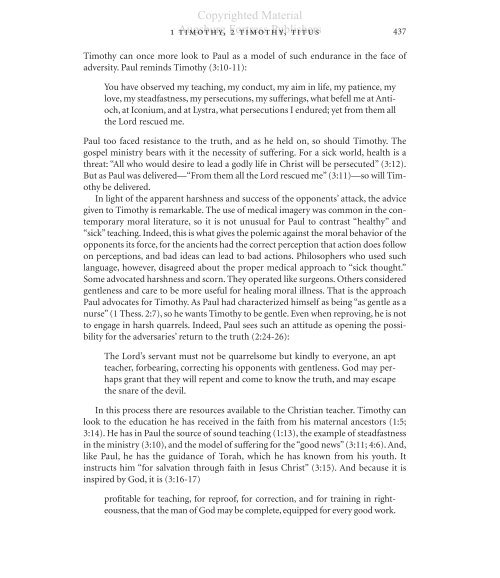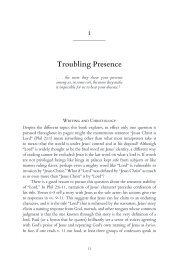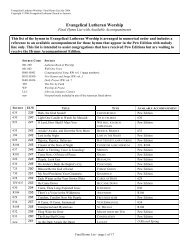19. Pastoral Letters: 1 Timothy, 2 Timothy, Titus - Augsburg Fortress
19. Pastoral Letters: 1 Timothy, 2 Timothy, Titus - Augsburg Fortress
19. Pastoral Letters: 1 Timothy, 2 Timothy, Titus - Augsburg Fortress
Create successful ePaper yourself
Turn your PDF publications into a flip-book with our unique Google optimized e-Paper software.
Copyrighted Material<br />
1 <strong>Augsburg</strong> timothy, <strong>Fortress</strong> 2 timothy, Publishers titus 437<br />
<strong>Timothy</strong> can once more look to Paul as a model of such endurance in the face of<br />
adversity. Paul reminds <strong>Timothy</strong> (3:10-11):<br />
You have observed my teaching, my conduct, my aim in life, my patience, my<br />
love, my steadfastness, my persecutions, my sufferings, what befell me at Antioch,<br />
at Iconium, and at Lystra, what persecutions I endured; yet from them all<br />
the Lord rescued me.<br />
Paul too faced resistance to the truth, and as he held on, so should <strong>Timothy</strong>. The<br />
gospel ministry bears with it the necessity of suffering. For a sick world, health is a<br />
threat: “All who would desire to lead a godly life in Christ will be persecuted” (3:12).<br />
But as Paul was delivered—“From them all the Lord rescued me” (3:11)—so will <strong>Timothy</strong><br />
be delivered.<br />
In light of the apparent harshness and success of the opponents’ attack, the advice<br />
given to <strong>Timothy</strong> is remarkable. The use of medical imagery was common in the contemporary<br />
moral literature, so it is not unusual for Paul to contrast “healthy” and<br />
“sick” teaching. Indeed, this is what gives the polemic against the moral behavior of the<br />
opponents its force, for the ancients had the correct perception that action does follow<br />
on perceptions, and bad ideas can lead to bad actions. Philosophers who used such<br />
language, however, disagreed about the proper medical approach to “sick thought.”<br />
Some advocated harshness and scorn. They operated like surgeons. Others considered<br />
gentleness and care to be more useful for healing moral illness. That is the approach<br />
Paul advocates for <strong>Timothy</strong>. As Paul had characterized himself as being “as gentle as a<br />
nurse” (1 Thess. 2:7), so he wants <strong>Timothy</strong> to be gentle. Even when reproving, he is not<br />
to engage in harsh quarrels. Indeed, Paul sees such an attitude as opening the possibility<br />
for the adversaries’ return to the truth (2:24-26):<br />
The Lord’s servant must not be quarrelsome but kindly to everyone, an apt<br />
teacher, forbearing, correcting his opponents with gentleness. God may perhaps<br />
grant that they will repent and come to know the truth, and may escape<br />
the snare of the devil.<br />
In this process there are resources available to the Christian teacher. <strong>Timothy</strong> can<br />
look to the education he has received in the faith from his maternal ancestors (1:5;<br />
3:14). He has in Paul the source of sound teaching (1:13), the example of steadfastness<br />
in the ministry (3:10), and the model of suffering for the “good news” (3:11; 4:6). And,<br />
like Paul, he has the guidance of Torah, which he has known from his youth. It<br />
instructs him “for salvation through faith in Jesus Christ” (3:15). And because it is<br />
inspired by God, it is (3:16-17)<br />
profitable for teaching, for reproof, for correction, and for training in righteousness,<br />
that the man of God may be complete, equipped for every good work.




